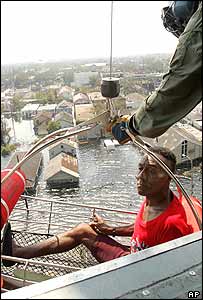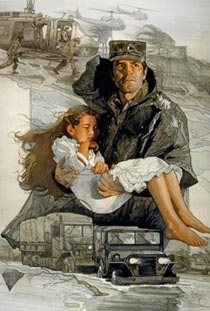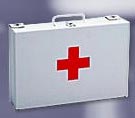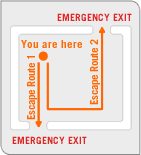| (insert your NIE or newspaper logo here) |
Weekly Online LessonOnline Lesson ArchiveGrade Level: 6-8
|
Guarding Against Disaster
 Four
years after the 9/11 tragedy caused panic, chaos, injury and death among
thousands of Americans on our home soil, the United States was hit with
another devastating blow to its people's sense of security.
Four
years after the 9/11 tragedy caused panic, chaos, injury and death among
thousands of Americans on our home soil, the United States was hit with
another devastating blow to its people's sense of security.
Following the force of Hurricane Katrina, torrential winds and unstoppable floods devastated areas in several states. The event stranded thousands of people, many of whom were unprepared for such a widespread and challenging set of circumstances, perhaps not really believing such a theoretical crisis could actually happen.
Local police and emergency service teams were caught off-guard when nearly all communication lines failed, which made maintaining order over an area the size of Great Britain an overwhelming and impossible feat.
Several days after the hurricane, a wave of relief came when thousands of National Guard troops—some even called back from duty in Iraq—landed on the ground to help restore calm and security to the region.
Since then, about 47,000 Guard soldiers in Louisiana, Mississippi, and Alabama, have been working to rescue survivors, recover bodies, and restore order.
Katrina has been a tough reminder to Americans that disaster can strike anytime, anywhere. From terrorism attacks to floods, wildfires to industrial accidents, it's clear that being prepared for the worst can mean the difference between life and death. And, when you can't help yourself, helping hands from the government, including the National Guard, can turn a hopeless situation into a hopeful one.
Every state and territory maintains its own regiments of National Guardsmen, as provided by the Constitution of the United States. They are charged with ensuring the security of their home state as well as that of the nation. Each regiment is essentially commanded by the state's governor, but that command can often be trumped by the President.
This week you'll also review some of the tools and guidelines laid out by the federal government after 9/11 that explains ways to be prepared for any disaster—foreseen or unforeseen—that may affect your life and that of your family or friends.
Go Guard
 Let's
start by exploring the History
of the National Guard at the Go Guard website.
Let's
start by exploring the History
of the National Guard at the Go Guard website.
After reading the introduction, open the Interactive Presentation or follow the history of the Guard using the individual links to static web pages.
When and for what purpose was The First Muster created? What exactly was the basic obligation and who was expected to participate?
Next, you'll discover how the colonial militiamen fared during The Revolutionary War, what role they played during The Civil War, and how New Mexico's cavalry turned the tide during The Spanish-American War.
 As our young nation grew and became more involved in international
affairs, the Guard was also called to duties beyond our borders. Guardsmen
fought in World
War I, World
War II, the Korean
War, the Vietnam
War, and Desert
Storm. What
types of roles did Guardsmen play in these various military operations?
As our young nation grew and became more involved in international
affairs, the Guard was also called to duties beyond our borders. Guardsmen
fought in World
War I, World
War II, the Korean
War, the Vietnam
War, and Desert
Storm. What
types of roles did Guardsmen play in these various military operations?
As you will discover, the National Guard has also served as a stepping stone in the careers of some American Presidents. Open the Interactive Presentation to browse through the gallery of Presidents who served in the Guard.
In what ways did these men contribute to the security of our nation? How did their efforts and participation in the military reflect their political and social beliefs? In what ways did their military service prepare them for serving as president?
What do you think might be some of the advantages for states and territories to maintain and control their own militias?
Guard Yourself
As you may have realized, even though Hurricane Katrina's devastation was predicted, government agencies still were unable to respond as quickly as people needed their help.
That means, that even though the National Guard or other emergency forces may eventually come to help, there's no telling how long a person might be stranded, awaiting rescue or medical aid.
Therefore, it is important for American citizens to first and foremost take responsibility for guarding themselves against disaster—to be prepared for a crisis, so that they can survive several days alone, if necessary.
 Start
preparing today by visiting Ready.gov,
where you can learn more about how to be Ready
America.
Start
preparing today by visiting Ready.gov,
where you can learn more about how to be Ready
America.
Begin with the Overview, keeping in mind that even though this guide was initially created in response to the 9/11 terrorist attacks, the site's suggestions are relevant for all kinds of emergencies.
Review Step 1, Step 2, and Step 3. First, Get a Kit, which should include Water & Food, a First Aid Kit, and ways to maintain Clean Air.
Make sure you've also got a Portable Kit, which should include additional items that can be useful. You will also want to double-check the Supply Checklists and add Special Needs Items, like medications, to your kit.
Besides having a kit, it's also critical that you and your family, guardians, and friends Make a Plan. In this section, you'll find tips for Creating a Family Plan and what you should consider in Deciding to Stay or Go during a crisis.
During what types of situations should you stay put? What are some ways to protect yourself in those circumstances?
 Of
course, people aren't necessarily at home when a crisis occurs. Therefore,
you should also plan what to do if you, family members, teachers and
classmates are stuck At
Work and School. Why would it be important to have family plans
in place if a disaster hits while your family is split up?
Of
course, people aren't necessarily at home when a crisis occurs. Therefore,
you should also plan what to do if you, family members, teachers and
classmates are stuck At
Work and School. Why would it be important to have family plans
in place if a disaster hits while your family is split up?
Lastly in this section, review tips on what to do if an emergency happens while you're In a Moving Vehicle or In a High-Rise Building.
What are some of the basic things to do in a crisis no matter where you are?
Another important line of defense during a crisis is to Be Informed about the kind of threats you may be faced with. Threats can be Biological or Chemical, or you might experience one or more Explosions or get caught up in a Natural Disaster.
What types of natural disasters should you be most prepared for, because of where you live or travel? Where might large explosions most likely occur in your area, and what would be the causes?
Although a generally lower risk than the other types of threats, make sure to also review what to do in case of a Nuclear Blast or Radiation Threat.
At this point, you might be thinking that preparing for trouble is, itself, too much trouble to bother with. But, in the end, being ready for the worst is one of the best things you can do for yourself, your family, and your country.
Newspaper Activities
Browse current issues of The Salt Lake Tribune for news about what National Guard troops are doing—whether it's assisting hurricane recovery, taking care of another crisis in the U.S., or supporting military efforts in Iraq or other distant locations. From what state are the troops based, and where have they been deployed? Are any from or in your home state? What other groups or government agencies are Guardsmen working with and for what common purpose? What specific tasks are the Guardsmen taking care of? What are civilians—either hurricane survivors or others come to help them—doing to aid recovery? In what ways were people prepared for this catastrophe? Had they gathered drinking water and food in advance? Did they have a portable kit prepared?
Also, look for any articles about what the federal or state governments have done since 9/11 to be better prepared for future crises. What programs have been well funded? Which have been under-funded? In light of the response to Katrina, are additional changes being proposed in policies or to the administration's staffing choices? In what ways is the government supporting public education to help individuals and families be better prepared for different emergencies?
© Copyright 2005
Learners Online, Inc.
